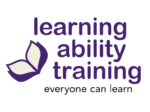Courses
Our Courses
The following are outlines of the basic content of our courses. All training can be bespoke to meet the individual needs of your learners and the people they support.
Please feel free to contact us to discuss your requirements.
Course / 01
Autism Awareness
This full day course explores ways of working effectively with people on the Autistic Spectrum. We look at strategies to support people across the four main areas of difficulty — communication, social relationships, imagination and flexibility, and sensory processing.
We support teams to develop plans to help people process information, reduce anxiety, and prepare for change.
Course / 02
Positive Behaviour Support
(including Breakaway)
This full day course examines why people sometimes display what is often called “challenging behaviour,” which we think of as “behaviour of distress.”
We will explore the functions of, and reasons of behavior, and consider our own roles in causing and changing these behaviours.
Learners are encouraged to explore a range of strategies to help people to express their needs in a socially acceptable manner and to develop a range of de-escalation skills.
Learners will demonstrate competency in breakaway techniques to make all people safe. (NB. We do NOT teach methods of restraint.)
Employers will be provided with a checklist of techniques in which learners have demonstrated competency.
Course / 03
Supporting People with Different Learning Abilities / Learning Disabilities
Course content includes:
- Definitions of Learning Disabilities
- Causes of Learning Disabilities
- History of People with Learning Disabilities
- Areas of Support
- Person-Centred Support
- Impacts of Learning Disability
- Promoting Independence
- Teaching Skills
Course / 04
Safeguarding
The course will explore definitions of safeguarding, highlight acts and indicators of all identified types of abuse and harm, and consider methods of reducing the risk of abuse.
Learners will identify legislation in recording and reporting, including the requirement to whistleblow when all internal avenues of reporting have been exhausted. Learners will examine scenarios and determine whether these constitute safeguarding alerts.
This is available as half or full day course. For learners completing the Care Certificate or those refreshing their knowledge, the half day course will be appropriate. For anyone else, we recommend the full day.
Course / 05
The Mental Capacity Act
Course content includes:
- Legislation prior to the MCA
- The Bournewood Case
- Development of the MCA
- Five Principles of the MCA
- Making Capacity Assessments
- Best Interest Scenarios
- Deprivation of Liberty Safeguards
Course / 06
Epilepsy Awareness
Learners will be able to:
- Develop an understanding of the causes of epilepsy
- Recognize the different types of seizure
- Promote confidence in your ability to respond safely to a seizure
- Understand the different types of Anti Epilepsy Drugs (AED) available
- Recognize the importance of risk assessment, recording, and care planning
Course / 07
Epilepsy and Administration of Buccal Midazolam
Course content includes:
- All content in the Epilepsy Awareness course plus practical demonstration of administering medication into buccal cavity
- Successful completion of this course will qualify learners to be able to administer Buccal Midazolam
Course / 08
Moving and Assisting of People
Learners will identify regulatory requirements, understand the importance of back care, examine unsafe techniques, and the importance of reporting witnessing of these techniques in the workplace.
Learners will demonstrate competency in supporting people to move from sitting to standing, walking to sitting, turning people on the bed, safe use of slide sheet, and hoisting people from bed to chair, and chair to bed.
Available as a full day course, or a half day refresher. Employers will be provided with a checklist of demonstrated competencies for each learner.
Course / 09
Basic Life Support
Course content includes:
- Dealing with an Unconscious Casualty
- Primary and Secondary Assessment
- Recovery Position (Front and Back)
- CPR (Including Demonstration of Using a Training Defibrillator)
- Response to Choking
- Wounds and Bandaging
[This is usually a half day course.]
Course / 10
Emergency First Aid at Work
Course content includes responding to:
- Unresponsive Casualty
- Choking
- Wounds and Bleeding
- Burns
- Seizures
- Heart Attack
- Stroke
- Shock
- Anaphylaxis
[A full day practical course.]
Course / 11
Safe Handling of Medication
Staff will learn about the legislation relevant to medication handling, and the legal requirements for administration, storage, disposal, and recording of medication.
Learners will consider different routes of administration and identify those which they are not permitted to administer without specialist accredited training. They will also demonstrate competency in completing MAR forms and knowledge of procedures to follow in the case of adverse reactions to medication.
Available as a full day course, or a half day refresher.
Course / 12
Health and Safety (including Infection Control and Food Safety)
Course content includes:
- Legislation
- Creating and using Risk Assessments
- Lone Working
- Recognising and Managing Stress
- Food Hygiene
- Infection Control (Including Use of PPE)
- Hydration and Nutrition
- Fire Safety
Course / 13
Observing for Competency
This course is designed for staff in a supervisory role to develop skills and knowledge to sign off competency assessments for the Care Certificate, Safe Handling of Medication, and Assisting People.
This will help with compliance for CQC inspections.
Course / 14
The Care Certificate
This 5-day course will take learners through all 15 units of the Care Certificate, the introductory qualification for all Health and Social Care workers in England and Wales.
At the end of the course, learners will need to be assessed for competency in the workplace. See our “Observing for Competency” course for how we can train senior staff in generating evidence for these outcomes.
This course is designed to help learners generate evidence towards the level 2 Diploma in Health and Social Care.
